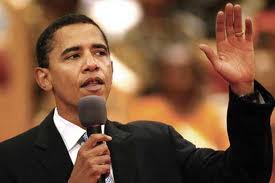
President Obama today called on Syrian President Bashar Assad to step down, as his brutal crackdown on the country’s uprising continues to escalate.
“The future of Syria must be determined by its people, but President Bashar al-Assad is standing in their way,” Obama said in a statement. “His calls for dialogue and reform have rung hollow while he is imprisoning, torturing and slaughtering his own people …”
For the sake of the Syrian people, the time has come for President Assad to step aside.”
Other countries are also expected to make similar statements in a coordinated show of international opposition to the regime.
The White House also announced a new executive order requiring the “immediate freeze of all assets of the government of Syria subject to U.S. jurisdiction and prohibiting U.S. persons from engaging in any transaction involving the government of Syria.”
At a meeting of the United Nations Security Council later this afternoon, the U.N.’s High Commissioner for Human Rights Navi Pillay is expected to suggest that the Security Council refer Assad to the International Criminal Court for his role in the violence.
Obama’s declaration has been in the works for weeks and the timing has been fluid. It was expected last week but was delayed. Some countries such as Turkey, Syria’s influential neighbor, urged the United States to hold off on the declaration to allow its diplomacy to work, but has made clear this week that its patience is running thin as Assad continues to flout its calls to end the violence.
The Obama administration has been reluctant to call on Assad to step down because the next question would be what it plans to do about it. The recent experience in Libya, where similar calls from the United States and others have been ignored, has also led some to urge caution.
As violence has increased in recent weeks, beginning with the military’s siege on the restive city of Hama and then spreading to other cities, the White House decided it was time to take the next step.
Secretary of State Hillary Clinton had cautioned against a rush to declare that Assad must go, saying such a move is more effective when others do so as well. To that end, the administration has been in talks with other countries to take coordinated action today as well.
The Obama administration has stepped carefully when discussing Syria. In his May 19 speech on this year’s uprisings in the Middle East and North Africa, the president declared Assad must reform or get out of the way. The administration eventually said Assad has lost that opportunity to reform and Clinton reluctantly said last month he had lost his legitimacy.
Recently, the administration has gone to the brink of calling on Assad to step down, with White House spokesman Jay Carney and Ambassador to the U.N. Susan Rice both saying that Syria would be better off without Assad in power.
The State Department began to prepare last week for the eventual change in policy when spokeswoman Victoria Nuland said the administration’s policy of engagement with Assad was over.
The U.S. has announced in recent weeks new sanctions on regime insiders and their business interests, hoping to cut off funding and support for Assad. It sent a senior adviser, Fred Hof, to Europe last week to rally support for coordinated action.
The administration is developing tough oil and gas sanctions, aiming for a key source of funding for the regime, and has urged other countries to halt energy deals with Syria. Clinton last week took to naming and shaming countries who still import energy from Syria and urging them to “get on the right side of history.”
Clinton specifically named India and China and said Europe must do more to squeeze the regime. She also called out Russia for continuing arms sale to Syria.

Leave a Reply
You must be logged in to post a comment.